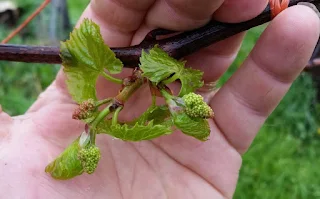I thought I was done planting tomatoes, but I was wrong.
 |
| Bella's palette for this year is hot yellows, oranges and reds. The Coleus are going to Mom's. She does not have as much sun as we have here. |
She has a "color palette" for landscaping and did not trust me to pick out plants.
While we were at the greenhouse one of the workers said "Joe, we have some plants for you in the back corner.
Yup. Another flat of tomatoes and a flat of Nicotiana sylvestris.
The irony is that I told Bella that if she sent me to pick flowers I would pick ones with inconspicuous flowers...like the Nicotiana.
The grape breeding program
The plan was for me to keep some Vitus riparia vines covered until we passed 150 GDD, b-50.
V. riparia is our common river-bank grape. I have a low-acid selection from Minnesota. V. riparia rarely has perfect flowers. They are either male or female.
That makes them easy to hybridize. Grapes with perfect flowers need to be emasculated, and covered with gauze and then pollinated with pollen from the selected male plant. Flowers that are purely female simply need to be protected from the males you don't want.
 |
| Those ghostly white things hanging on the canes are buds that pushed even though I had them covered and weighted to hold them close to the ground. |
Since V. riparia is a very, very early flowering grape all I have to do to guarantee than V. riparia is not the male parent is to slow down the intended female canes. By delaying them, they will not be receptive until after all of the local V. riparia males are finished. I judged the appropriate amount of delay to be about 150 GDD.
My hope is that the male parent will be one of the grapes with larger clusters. The V. riparia has clusters that average about 20 grams, a bit less than an ounce. I have a couple of selections that have half-pound clusters. It is a lot faster to pick when the clusters are larger.
Why bother hybridizing grapes? Well, for one thing, it is easy. For another, professional grape breeders tend to focus on what works and inadvertently fall into the trap of in-breeding depression.
V. riparia is extremely cold-hardy and might offer a source of downy mildew resistance if the male parent should happen to be a grape like Swenson Red.


I have 40 tomatoes in the greenhouse. Can't grow them outside here. They are mostly in seven gallon bags and are mostly supported by strings to the ceiling and clips. Beans and squash are in the house germinating and will be transplanted into the hoop house through black plastic. Have the earliest seed crops are in beds in the hoop house because our outside ground is just now dry enough.
ReplyDelete